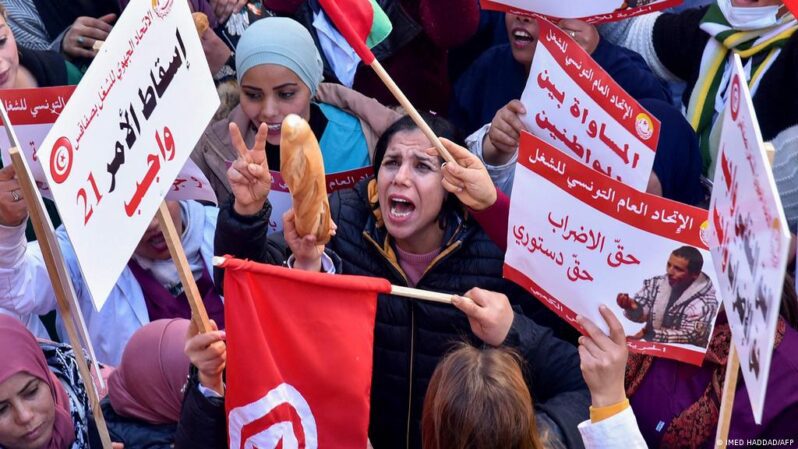Tunisia “Security” Judges Ignored Pleas of Prisoners

Editor’s note: Tunisia has held public hearing sessions for victims of state oppression. On that occasion, the archives of the security apparatus and the exceptional courts operating under the governments of the First Tunisian Republic are a valuable relevant resource for reflection. This article examines the State Security Court archives held at the National Archives of Tunisia, with the topic of the public hearings in mind. It brings to light the letters addressed by the victims and their families, and acquaintances to the court’s investigating judges. It should be noted that this court was established “to probe the felonies and crimes related to internal and external state security, and to tackle head on outlaws who harbor demonic ideas aiming at targeting internal and external state security”.[1]
The political crises under the rule of Habib Bourguiba entailed frequent calls for this court to convene, and for its provisions to apply to all political families and union activists opposed to the regime. The State Security Court’s history has been associated with the crisis of rule in that era. In order to disengage from the effect of this association, Bourguiba’s successor Zine El Abidine Ben Ali decided to abolish this court right after he assumed the presidency at the end of 1987.[2] Since then, the State Security Court has become part of the Tunisian political and judicial history.
The case of the “Tunisian Socialist Studies and Labor Group” was one of the first cases referred to the State Security Court. The case concerned a group of university students and administrators of communist tendencies who had issued statements and drafted texts calling for reform, criticizing the authoritarian rule of President Habib Bourguiba and suggesting communism as an alternative system to the one existing then.[3] The investigating judge presiding the court referred to them as “all who profess the Communist Marxist-Leninist doctrine and sow discord and foment the people against the rule [of the state]”, or also “those who conspired against the security of the state” as their bill of indictment states. At the time, there were 157 defendants, including 60 students, while the remainder were top administrators, namely university professors as well as academic and government officials.
Archival examination reveals that the investigating judge represented a key figure for those defendants [in detention] that were critical of the status quo, even though his judicial role was limited to issuing deputation to the Ministry of Interior’s Territorial Integrity Division (later named the State Security Division) immediately after the initial hearing of the defendant. Following this, a second hearing session was held for the same indictee which eventually ended with an issuance of a decision to close the investigation, instructing the ruling department of the State Security Court to endorse the confessions recorded at the deputy investigator’s office. Letters from the defendants to the judge reveal that the defendants, their families, and in some cases their acquaintances attempted to convince the judge to play a greater role. There are 77 correspondences distributed over the three files of this case, all directed to the “magistrate judge of the State Security Court”. These letters can be categorized according to the sender, as follows.
-
Two letters sent by academic authorities. The first one sent by a university professor in France to the Tunisian investigating judge, telling the latter about the distinguished academic performance of the accused student Mohammed Sharafi[4] and his sapience. His prudence and moderation earned him a special scholarship during the year he was detained. The second letter was sent by a French university professor and former director of the School of Arts in Tunis, where he talked about the commendable traits of student Ahmad bin Othman Raddawi[5];
-
Thirteen letters from parents of detained defendants, with requests ranging from granting permission for a detained son to apply for the baccalaureate exam [a standardized test required in order to gain admission into universities in Tunisia], to requests seeking “to improve visiting conditions” or “to release a son who is the breadwinner of his family”. Among these correspondences are two subsequent ones addressed by a prisoner’s mother requesting to allow her son to visit his dying father who wishes to see him, followed by another one sent asking to allow her son to attend his father's funeral, who died without being able to see him;
-
Three letters requesting special visits, one penned by a friend of a detainee, and two others by the consul general of France in Tunis on permitting two French men to visit a prisoner who has a personal relationship with them; and
-
Fifty-eight letters addressed to the investigating judge by the defendants themselves.[6] They can be categorized according to subject, as follows.
-
Letters concerning the trial proceedings, mostly protesting over such proceedings or requesting to expedite the trial. Among them are two appealing to have the torture marks on their bodies examined before they fade, and to undergo a medical examination for this purpose. There are also seven letters protesting over a decision by an investigating judge who denied them release, asking him to reconsider his decision. In this context, one of the most prominent letters is that of “defendant Khamis al-Shammari”[7] for it stated principles concerning the defendant's right to liberty, and advocated the independence of the judiciary. What is remarkable here is that this letter written by a defendant denied of his freedom is addressed to a judge who does not believe in this right;
-
Thirty letters directly pertaining to the conditions of detention, such as demanding an end to solitary confinement. Those correspondences also included requests concerning the rights of prisoners, such as recognition as a prisoner of conscience and separating those from public right prisoners; providing prisoners with pens, books and notebooks; and the right to listen to the radio and read newspapers. Two of them also included statements on starting a hunger strike in protest against ignoring their demands; and
-
Letters on exercising rights of a social nature, including letters by two defendants who requested to get married in prison and expressed their desire to marry despite the “detention”. However, only one defendant sought to repudiate the charges against him by declaring his loyalty to the regime (his affiliation to the Socialist Destourian Party, and his total support to leader Habib Bourguiba whom he wished a long life). The letter expressed a flat rejection of communist ideologies.
The letters varied in terms of requests. The investigating judge did not consent except for the two visit requests by the French consul general. The decision by the investigating judge regarding the rest of the requests was the same: He merely added the following to their dossier: Updated. That same-decision patterns despite the difference in the subject of requests confirms that the policy of ignoring the requests and letters, and refraining from taking any decision was a systematic approach adopted by investigating judges at the State Security Court.
Finally, the requests contained in the letters of the State Security Court’s suspects (convicts) indicate that the judges who took on the task of going after the stray contingent have been practically going after their [political] beliefs and thoughts, in service of the totalitarian regime. While these letters reveal the suffering of young people who had been hoping to enjoy the right to education or start a family, they also show the determination of their writers to serve their country according to their intellectual convictions, even if it takes great sacrifices on their part. Opening the files of the past does so much in healing its wounds and in foreseeing the future.
This article is an edited translation from Arabic
__________
[1] Deliberations of the Tunisian National Assembly, No. 19 on September 30, 1968.
[2] The State Security Court was abolished under Law No. 79 of 1987, dated December 29, 1987.
[3] The case started at the level of the investigating judge, File No. 26958. The investigating judge later divided the file into three cases based on the charges. Perhaps this division is due to the ruling authority’s attempt to restrict follow-up of the case by human rights organizations.
[4] Mohammad Sharafi was released from prison after serving 15 months of his sentence. He completed his university studies to become one of the most prominent jurists in Tunisia. Sharafi served as the minister of education from 1990 to 1994, and laid down an important program for reform in education. However, he had affiliation with the government during the most important stages of the security grip of Zine El Abidine Ben Ali’s regime.
[5] Ahmad bin Othman Raddawi is one of the most prominent human rights activists and one of the founders of the Amnesty International office in Tunisia. He died in 2008.
[6] 58 letters: 28 requesting political prisoner rights; 2 letters announcing a hunger strike; 6 requesting release; 2 requesting a permission to apply for an exam; 4 protesting over torture and ill-treatment; 3 requesting the right to see their families; 1 requesting to authorize wife for disposition of funds; 1 letter of apology; 2 requesting to see a lawyer; 7 protesting over refusal to grant release; and, 2 requesting permission to marry.
[7] Khamis Shammari is one of the most prominent Tunisian activists and politicians before the revolution. After the revolution, he was elected as a member of the Truth and Dignity Commission, but later resigned.



